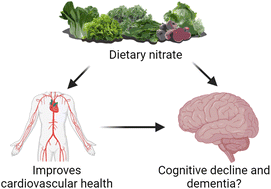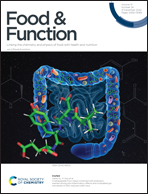Potential role of dietary nitrate in relation to cardiovascular and cerebrovascular health, cognition, cognitive decline and dementia: a review
Abstract
There is currently no effective treatment for dementia, of which Alzheimer's disease (AD) is the most common form. It is, therefore, imperative to focus on evidence-based preventive strategies to combat this extremely debilitating chronic disease. Nitric oxide (NO) is a key signalling molecule in the cardiovascular, cerebrovascular, and central nervous systems. Vegetables rich in nitrate, such as spinach and beetroot, are an important source of NO, with beneficial effects on validated markers of cardiovascular health and an association with a lower risk of cardiovascular disease. Given the link between cardiovascular disease risk factors and dementia, together with the important role of NO in vascular health and cognition, it is important to determine whether dietary nitrate could also improve cognitive function, markers of brain health, and lower risk of dementia. This review presents an overview of NO's role in the cardiovascular, cerebrovascular, and central nervous systems; an overview of the available evidence that nitrate, through effects on NO, improves cardiovascular health; and evaluates the current evidence regarding dietary nitrate's potential role in cerebrovascular health, cognitive function, and brain health assessed via biomarkers.

- This article is part of the themed collection: Food & Function Review Articles 2022


 Please wait while we load your content...
Please wait while we load your content...